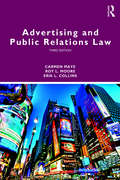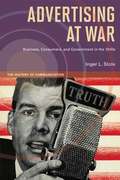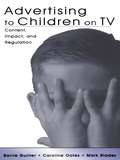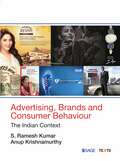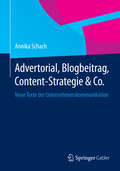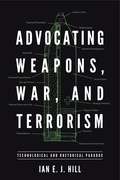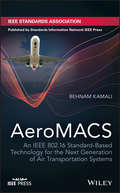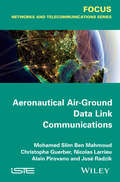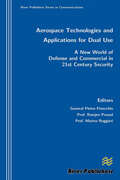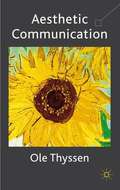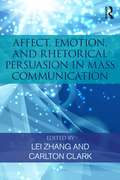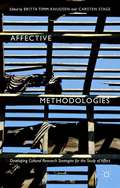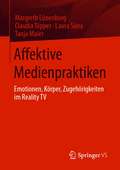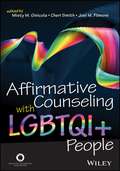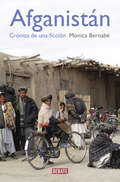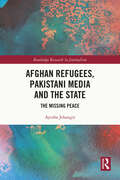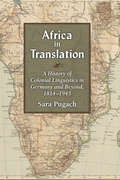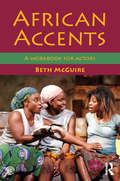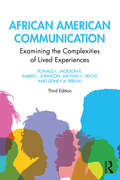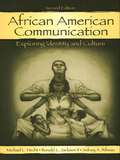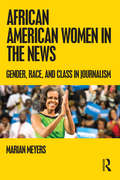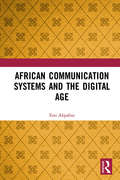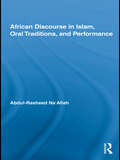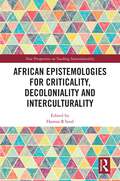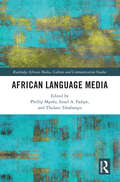- Table View
- List View
Advertising and Public Relations Law (Routledge Communication Series)
by Roy L. Moore Carmen Maye Erik L. CollinsAddressing a critical need, Advertising and Public Relations Law explores the issues and ideas that affect the regulation of advertising and public relations speech, some of the most dynamic and prevalent areas of professional communications today. This updated third edition explores the categorization of different kinds of speech and their varying levels of First Amendment protection as well as common areas of litigation for communicators such as defamation, invasion of privacy, and copyright and trademark infringement. Features of this edition include: A new chapter on Internet-related laws affecting advertising and public relations speech. History and background of major legal theories affecting professional communicators. Extended excerpts from major court decisions. Overviews of relevant federal and state regulatory schemes, including those promulgated and enforced by the FTC, FCC, FDA and others. Appendices providing a legal glossary, a chart of the judicial system, sample model releases and copyright agreement forms. The volume is developed for upper-level undergraduate and graduate students in media, advertising and public relations law or regulation courses. It also serves as an essential reference for advertising and public relations practitioners.
Advertising at War: Business, Consumers, and Government in the 1940s
by Inger L StoleAdvertising at War challenges the notion that advertising disappeared as a political issue in the United States in 1938 with the passage of the Wheeler-Lea Amendment to the Federal Trade Commission Act, the result of more than a decade of campaigning to regulate the advertising industry. Inger L. Stole suggests that the war experience, even more than the legislative battles of the 1930s, defined the role of advertising in U.S. postwar political economy and the nation's cultural firmament. She argues that Washington and Madison Avenue were soon working in tandem with the creation of the Advertising Council in 1942, a joint effort established by the Office of War Information, the Association of National Advertisers, and the American Association of Advertising Agencies. Using archival sources, newspapers accounts, and trade publications, Stole demonstrates that the war elevated and magnified the seeming contradictions of advertising and allowed critics of these practices one final opportunity to corral and regulate the institution of advertising. Exploring how New Dealers and consumer advocates such as the Consumers Union battled the advertising industry, Advertising at War traces the debate over two basic policy questions: whether advertising should continue to be a tax-deductible business expense during the war, and whether the government should require effective standards and labeling for consumer products, which would render most advertising irrelevant. Ultimately the postwar climate of political intolerance and reverence for free enterprise quashed critical investigations into the advertising industry. While advertising could be criticized or lampooned, the institution itself became inviolable.
Advertising to Children on TV: Content, Impact, and Regulation
by Barrie Gunter Caroline Oates Mark BladesConcern is growing about the effectiveness of television advertising regulation in the light of technological developments in the media. The current rapid growth of TV platforms in terrestrial, sattelite, and cable formats will soon move into digital transmission. These all offer opportunities for greater commercialization through advertising on media that have not previously been exploited. In democratic societies, there is a tension between freedom of speech rights and the harm that might be done to children through commercial messages. This book explores all of these issues and looks to the future in considering how effective codes of practice and regulation will develop.
Advertising, Brands and Consumer Behaviour: The Indian Context
by S Ramesh Kumar Anup KrishnamurthyThe book Advertising, Brands and Consumer Behaviour through the exploration of 79 well-known Indian brands, explains how consumer behaviour is applied in conjunction with advertising management and brands. The Indian examples from varied product categories will enable students to identify with the conceptual linkages that occur across branding, advertising and consumer behaviour. The USP of the book is that it adds value and practical insights to the fundamentals dealt with in the various textbooks on the subject. Besides being a reference book for students of post graduate programmes in management, the book will be useful for professionals in the domain of marketing. The exercises presented in the book will enable students to readily connect with the Indian environment. Further, there are references to research readings that will help readers to probe deeper into the linkages across the three subjects. Key Features: Focuses on building conceptual perspectives that trigger critical thinking in a given context Provides real-life examples of brands (creating theory - practice linkages) Covers several well-known Indian brands across product categories Includes online resources explaining the use of the book for instructors of consumer behaviour courses and related subjects.
Advertorial, Blogbeitrag, Content-Strategie & Co.: Neue Texte der Unternehmenskommunikation
by Annika SchachInternet, Social Media und der Wettbewerb um Aufmerksamkeit: Diese Entwicklungen stellen die Unternehmenskommunikation vor neue Herausforderungen. Content-Strategien und die Technik des Storytellings helfen, mit relevanten Zielgruppen zu kommunizieren. In den Public Relations und im Marketing haben sich eine Reihe neuer Textsorten in den Bereichen Paid, Earned und Owned Media entwickelt. Die Autorin gibt einen umfassenden theoretischen und praxisnahen Überblick zu allen relevanten Texten der Unternehmenskommunikation, insbesondere an den Schnittstellen von PR, Werbung und Journalismus. Im ersten Teil werden ausführlich die aktuellen Entwicklungen in der Unternehmenskommunikation und die Auswirkungen auf die Arbeit mit PR-Texten und Sprachstilen thematisiert. Der zweite Teil stellt alle relevanten Textsorten anhand von Definitionen, Inhalten und Aufbau, von sprachlichen Merkmalen und Praxisbeispielen vor - vom Advertorial über den Blogbeitrag bis zur Content-Strategie. Das Ergebnis ist ein unverzichtbarer Leitfaden für alle, die heute professionell Unternehmenskommunikation betreiben möchten - für Ausbildung, Studium und Berufspraxis in Marketing und PR.
Advocating Weapons, War, and Terrorism: Technological and Rhetorical Paradox (RSA Series in Transdisciplinary Rhetoric #9)
by Ian E. HillTechnē’s Paradox—a frequent theme in science fiction—is the commonplace belief that technology has both the potential to annihilate humanity and to preserve it. Advocating Weapons, War, and Terrorism looks at how this paradox applies to some of the most dangerous of technologies: population bombs, dynamite bombs, chemical weapons, nuclear weapons, and improvised explosive devices.Hill’s study analyzes the rhetoric used to promote such weapons in the nineteenth and twentieth centuries. By examining Thomas R. Malthus’s Essay on the Principle of Population, the courtroom address of accused Haymarket bomber August Spies, the army textbook Chemical Warfare by Major General Amos A. Fries and Clarence J. West, the life and letters of Manhattan Project physicist Leo Szilard, and the writings of Ted “Unabomber” Kaczynski, Hill shows how contemporary societies are equipped with abundant rhetorical means to describe and debate the extreme capacities of weapons to both destroy and protect. The book takes a middle-way approach between language and materialism that combines traditional rhetorical criticism of texts with analyses of the persuasive force of weapons themselves, as objects, irrespective of human intervention. Advocating Weapons, War, and Terrorism is the first study of its kind, revealing how the combination of weapons and rhetoric facilitated the magnitude of killing in the nineteenth and twentieth centuries, and illuminating how humanity understands and acts upon its propensity for violence. This book will be invaluable for scholars of rhetoric, scholars of science and technology, and the study of warfare.
AeroMACS: An IEEE 802.16 Standard-Based Technology for the Next Generation of Air Transportation Systems
by Behnam KamaliThis is a pioneering textbook on the comprehensive description of AeroMACS technology. It also presents the process of developing a new technology based on an established standard, in this case IEEE802.16 standards suite. The text introduces readers to the field of airport surface communications systems and provides them with comprehensive coverage of one the key components of the Next Generation Air Transportation System (NextGen); i.e., AeroMACS. It begins with a critical review of the legacy aeronautical communications system and a discussion of the impetus behind its replacement with network-centric digital technologies. It then describes wireless mobile channel characteristics in general, and focuses on the airport surface channel over the 5GHz band. This is followed by an extensive coverage of major features of IEEE 802.16-2009 Physical Layer (PHY)and Medium Access Control (MAC) Sublayer. The text then provides a comprehensive coverage of the AeroMACS standardization process, from technology selection to network deployment. AeroMACS is then explored as a short-range high-data-throughput broadband wireless communications system, with concentration on the AeroMACS PHY layer and MAC sublayer main features, followed by making a strong case in favor of the IEEE 802.16j Amendment as the foundational standard for AeroMACS networks. AeroMACS: An IEEE 802.16 Standard-Based Technology for the Next Generation of Air Transportation Systems covers topics such as Orthogonal Frequency Division Multiple Access (OFDMA), coded OFDMA, scalable OFDMA, Adaptive Modulation-Coding (AMC), Multiple-Input Multiple-Output (MIMO) systems, Error Control Coding (ECC) and Automatic Repeat Request (ARQ) techniques, Time Division Duplexing (TDD), Inter-Application Interference (IAI), and so on. It also looks at future trends and developments of AeroMACS networks as they are deployed across the world, focusing on concepts that may be applied to improve the future capacity. In addition, this text: Discusses the challenges posed by complexities of airport radio channels as well as those pertaining to broadband transmissions Examines physical layer (PHY) and Media Access Control (MAC) sublayer protocols and signal processing techniques of AeroMACS inherited from IEEE 802.16 standard and WiMAX networks Compares AeroMACS and how it relates to IEEE 802.16 Standard-Based WiMAX AeroMACS: An IEEE 802.16 Standard-Based Technology for the Next Generation of Air Transportation Systems will appeal to engineers and technical professionals involved in the research and development of AeroMACS, technical staffers of government agencies in aviation sectors, and graduate students interested in standard-based wireless networking analysis, design, and development.
Aeronautical Air-Ground Data Link Communications
by Nicolas Larrieu Mohamed Slim Ben Mahmoud Christophe Guerber José Radzik Alain PirovanoThis book deals with air-ground aeronautical communications. The main goal is to give the reader a survey of the currently deployed, emerging and future communications systems dedicated to digital data communications between the aircraft and the ground, namely the data link. Those communication systems show specific properties relatively to those commonly used for terrestrial communications. In this book, the system architectures are more specifically considered from the access to the application layers as radio and physical functionalities have already been addressed in detail in others books.The first part is an introduction to aeronautical communications, their specific concepts, properties, requirements and terminology. The second part presents the currently used systems for air ground communications in continental and oceanic area. The third part enlightens the reader on the emerging and future communication systems and some leading research projects focused on this scope. Finally, before the conclusion, the fourth part gives several main challenges and research directions currently under investigation.
Aerospace Technologies and Applications for Dual Use
by Ramjee Prasad Giacinto Losquadro Hugh Griffiths Marina Ruggieri S. Greco Alexander Soucek Albena Mihovska General Pietro Finocchio Pietro Finocchio Giuseppe Morsillo Mario L. Cosmo Paul E. Gartz Gerardo Lancia G. C. Grasso Enrico Saggese S. Venturi P. Massafra K. P. Doerpelkus Carlo Alberto Penazzi Renzo Meschini Armando Buccheri Marco Tommasi Giovanni Guidotti Nunzio Cocco Marina Grossi Daniele Mortari Carlo Des Dorides Mario Ciampini S. Vetrella L. Verde U. Ciniglio F. Corraro Andrea De Martino Sergio Attilio Jesi Volker Liebig Giuseppe Veredice Ole Mørk Lauridsen L. Pasquali Massimo Capaldo Vittorio Dainelli Cosimo La Rocca Alexander Mager Tiziano Sassorossi S. Arenaccio G. Chiassarini R. Loforti F. Petrosino A. Vernucci Claudio De Bellis Michel Feuga Elisa Tonello Domenico D'Angelo Mesut CicekerThe events occurred in the last years have shown how the threat related to both intentional and natural disasters could bring the civil and the military worlds closer in the conceivement and deployment of countermeasures as well as in the identification of effective strategies for enhancing the Planet safety and security. In this frame, the concept of dual use ? the set of technologies and applications that can be exploited for both civil and military purposes - becomes a key-topic. In addition, the aerospace is a strategic building block in the deployment of a network centric environment that aims at the global protection of the mankind. Aerospace is also a natural environment for dual use: many of the related enabling technologies have been first developed for the military world and then applied to civil ? including commercial - purposes.On September 12-14, 2007 an International Symposium has been held in Roma, Italy, joining the dual use approach with the aerospace technology: the international community has been gathered around the key-topic: aerospace technologies and applications for dual use. The event has called experts and operators from the military and civil community, belonging to industry, scientific and governmental institutions. The common aim was an effective convergence between the available and perspected technologies for the civil and military worlds as well as the conceivement of applications that can take the maximum benefit from the dual approach, optimizing the available economic resources. The Symposium has included invited-only contributions and an industrial panel. The main results of the Symposium, derived from key-note speeches, invited lectures, panel discussions and conclusions have created the starting material to develop this Edited Book.
Aesthetic Communication
by Ole ThyssenThis book deals with the organizational use of aesthetic means. Based on the idea that organizations are systems of communication, it is shown that consciously or not, organizations have always used aesthetic means to reinforce their communication.
Affect, Emotion, and Rhetorical Persuasion in Mass Communication
by Lei Zhang Carlton ClarkThis volume examines the interplay between affect theory and rhetorical persuasion in mass communication. The essays collected here draw connections between affect theory, rhetorical studies, mass communication theory, cultural studies, political science, sociology, and a host of other disciplines. Contributions from a wide range of scholars feature theoretical overviews and critical perspectives on the movement commonly referred to as "the affective turn" as well as case studies. Critical investigations of the rhetorical strategies behind the 2016 United States presidential election, public health and antiterrorism mass media campaigns, television commercials, and the digital spread of fake news, among other issues, will prove to be both timely and of enduring value. This book will be of use to advanced undergraduates, graduate students, and active researchers in communication, rhetoric, political science, social psychology, sociology, and cultural studies.
Affective Methodologies: Developing Cultural Research Strategies For The Study Of Affect
by Britta Timm Knudsen Carsten StageThe collection proposes inventive research strategies for the study of the affective and fluctuating dimensions of cultural life. It presents studies of nightclubs, YouTube memes, political provocations, heritage sites, blogging, education development, and haunting memories.
Affektive Medienpraktiken: Emotionen, Körper, Zugehörigkeiten im Reality TV
by Margreth Lünenborg Claudia Töpper Laura Sūna Tanja MaierDas Buch liefert eine affekttheoretisch informierte Analyse des Reality TV. Dabei wird das komplexe Affektgeschehen zwischen Fernsehsendung, Medientechnologie und den Körpern der Zuschauenden empirisch zugänglich und sichtbar. Eine multiperspektivische Analyse zeigt auf, welche Strategien und Muster der Erzeugung von Affekten und Emotionen Fernsehproduzent*innen nutzen, wie Inklusion und Exklusion im audiovisuellen Medientext für Zuschauende körperlich spürbar wird und welche Spuren Affekte in den Körpern und den Diskursen des Publikums hinterlassen. Auf den Ebenen Körper, Diskurse und Praktiken werden auf diese Weise affektive Dynamiken der Aushandlung von Zugehörigkeiten analysiert. Die Studie leistet damit einen methodisch wie auch theoretisch innovativen Beitrag zur Affekt- und Emotionsforschung in der Kommunikationswissenschaft.
Affirmative Counseling With LGBTQI + People
by Cheri Smith Misty M. Ginicola Joel M. FilmorePossessing counseling competence in serving the lesbian, gay, bisexual, transgender, queer, ques-tioning, intersex, asexual, ally, pansexual/polysexual, and two-spirited (LGBTQQLAAP-2S, henceforth referred to as LGBTQI+) communities is important, particularly because previous research has shown that large numbers of this population seek therapy. If counselors are unprepared for work with this population, they could potentially do harm to these clients. Many counselors have not received adequate training to work with affectional orientation and gender minority clients; LGBTQI+ clients are aware of this deficit in the field and prescreen therapists for safety and competence in issues of affectional orientation and gender orientation. Although many standard counseling interventions will be appropriate for work with the LGBTQI+ population, counselors need an awareness and knowledge of this population and its cultures and subcultures that extend beyond typical client concerns.
Afganistán: Crónica de una ficción
by Mónica BernabéLa historia reciente de Afganistán narrada por la única corresponsal española que vive en el país. Afganistán se ha convertido en un nombre cotidiano sin quererlo, en una imposición política, en un conflicto no deseado que, tras muchos años de lucha, sigue sin resolverse. Mònica Bernabé es la única periodista española que vive en Afganistán, una observadora privilegiada que nos cuenta la historia del país a través de su experiencia y narra los acontecimientos que han marcado una década: desde la caída del régimen talibán en el año 2001 hasta la quema de coranes de 2012, pasando por la violencia endémica contra las mujeres y el mito del burqa, las duras condiciones de vida en el frente, la nueva estrategia de Obama o la realidad de las tropas españolas en el país. Bernabé da voz al pueblo afgano en una crónica extraordinaria que se aleja de toda manipulación mediática y revela la verdad sobre el conflicto que ha conseguido desacreditar la política intervencionista de Occidente.
Afghan Refugees, Pakistani Media and the State: The Missing Peace (Routledge Research in Journalism)
by Ayesha JehangirDrawing on the frameworks of peace journalism, this book offers new insights into the Pakistani media coverage of Afghan refugees and their forced repatriation from Pakistan. Based on a three-year-study, the author examines the political, social and economic forces that influence and govern the reporting practices of journalists covering the protracted refugee conflict between Pakistan and Afghanistan. Through a critical discourse analysis of the structures of journalistic iterability of Afghan refugees in Pakistan, the author distils four dominant and three emerging frames, and proposes a new teleological turn for peace journalism as deliberative practice, that is to say practice that by promoting transparency and accountability (recognition) and challenging dominant power-proposed narratives and perspectives (resistance) encourages public engagement and participation (cosmopolitan solidarity). The author also privileges an analytical approach that conceptualises the nexus between digital witnessing and peace journalism through the paradigm of cosmopolitanism. The author finds routinely accommodated media narratives of security that represent Afghan refugees as a ‘threat’, a ‘burden’ and the ‘other’ that, through reinforcement, have become an incontestable reality for the public in Pakistan. This book will appeal to those interested in studying and practicing journalism as a conscientious communicative practice that elicits the very public it seeks to inform.
Africa in Translation: A History of Colonial Linguistics in Germany and Beyond, 1814-1945
by Sara Pugach"Africa in Translationis a thoughtful contribution to the literature on colonialism and culture in Germany and will find readers in the fields of German history and German studies as well as appealing to audiences in the large and interdisciplinary fields of colonialism and postcolonialism. " ---Jennifer Jenkins, University of Toronto The study of African languages in Germany, or Afrikanistik, originated among Protestant missionaries in the early nineteenth century and was incorporated into German universities after Germany entered the "Scramble for Africa" and became a colonial power in the 1880s. Despite its long history, few know about the German literature on African languages or the prominence of Germans in the discipline of African philology. InAfrica in Translation: A History of Colonial Linguistics in Germany and Beyond, 1814--1945, Sara Pugach works to fill this gap, arguing that Afrikanistik was essential to the construction of racialist knowledge in Germany. While in other countries biological explanations of African difference were central to African studies, the German approach was essentially linguistic, linking language to culture and national identity. Pugach traces this linguistic focus back to the missionaries' belief that conversion could not occur unless the "Word" was allowed to touch a person's heart in his or her native language, as well as to the connection between German missionaries living in Africa and armchair linguists in places like Berlin and Hamburg. Over the years, this resulted in Afrikanistik scholars using language and culture rather than biology to categorize African ethnic and racial groups. Africa in Translationfollows the history of Afrikanistik from its roots in the missionaries' practical linguistic concerns to its development as an academic subject in both Germany and South Africa throughout the nineteenth and twentieth centuries. Sara Pugach is Assistant Professor of History at California State University, Los Angeles. Jacket image: Perthes, Justus. Mittel und Süd-Afrika. Map. Courtesy of the University of Michigan's Stephen S. Clark Library map collection.
African Accents: A Workbook for Actors
by Beth McGuireThis is a comprehensive workbook for actors, covering the key characteristics and profiles of a wide range of African accents of English. Its unique approach not only addresses the methods and processes by which to go about learning an accent, but also looks in detail at each example. This lets the reader plot their own route through the learning process and tailor not only their working methods but also their own personal idiolect. Full breakdowns of each accent cover: an introduction giving a brief history of the accent, its ethnic background, and its language of origin preparatory warm-up exercises specific to each accent a directory of research materials including documentaries, plays, films and online resources key characteristics such as melody, stress, pace and pitch descriptions of physical articulation in the tongue, lips, jaw, palate and pharynx practice sentences, phoneme tables and worksheets for solo study. African Accents is accompanied by a website at www.routledge.com/cw/mcguire with an extensive online database of audio samples for each accent. The book and audio resources guide actors to develop their own authentic accents, rather than simply to mimic native speakers. This process allows the actor to personalize an accent, and to integrate it into the creation of character rather than to play the accent on top of character.
African American Communication: Examining the Complexities of Lived Experiences (Routledge Communication Series #Vol. 2)
by Michael L. Hecht Sidney A. Ribeau Ronald L. Jackson II Amber L. JohnsonNow in its third edition, this text examines how African Americans personally and culturally define themselves and how that definition informs their communication habits, practices, and norms. This edition includes new chapters that highlight discussions of gender and sexuality, intersectional differences, contemporary social movements, and digital and mediated communication. The book is ideally suited for advanced students and scholars in intercultural communication, interpersonal communication, communication theory, African American/Black studies, gender studies, and family studies.
African American Communication: Exploring Identity and Culture
by Michael L. Hecht Ronald L. Jackson Sidney A. RibeauWhat communicative experiences are particular to African Americans? How do many African Americans define themselves culturally? How do they perceive intracultural and intercultural communication? These questions are answered in this second edition of African American Communication: Exploring Identity and Culture. Informing multiple audiences interested in African American culture, from cultural researchers and practitioners to educators, policymakers, and community leaders, this innovative and invaluable resource examines the richness and depth of African American communication norms and patterns, as well as African American identities. Positive and healthy African American identities are centrally positioned throughout the book. Applying the cultural contracts theory and the communication theory of identity, authors Michael L. Hecht, Ronald L. Jackson II, and Sidney A. Ribeau explore relationships among African Americans, as well as between African Americans and European Americans, while highlighting the need for sensitivity to issues of power when discussing race, ethnicity, and culture. This wide-ranging volume provides an extensive review of the relevant literature and offers recommendations designed to encourage understanding of African American communication in a context extending beyond Eurocentric paradigms. Considering African American identity with a communicative, linguistic, and relational focus, this volume: *Defines African American identities by describing related terms, such as self, self-concept, personhood and identity; *Explores Afrocentricity and African American discourse; *Examines the status of African Americans in the United States using census statistics and national studies from other research agencies; *Considers identity negotiation and competence; and *Features a full chapter on African American relationships, including gendered, familial, intimate, adolescent and adult, homosexual, friendship, communal, and workplace relationships. African American Communication: Exploring Identity and Culture begins an important dialogue in the communication discipline, intercultural studies, African American studies and other fields concerned with the centrality of culture and communication as it relates to human behavior. It is intended for advanced students and scholars in intercultural communication, interpersonal communication, communication theory, African American/Black studies, social psychology, sociolinguistics, education, and family studies.
African American Women in the News: Gender, Race, and Class in Journalism
by Marian MeyersAfrican American Women in the News offers the first in-depth examination of the varied representations of Black women in American journalism, from analyses of coverage of domestic abuse and "crack mothers" to exploration of new media coverage of Michelle Obama on Youtube. Marian Meyers interrogates the complex and often contradictory images of African American women in news media through detailed studies of national and local news, the mainstream and Black press, and traditional news outlets as well as newer digital platforms. She argues that previous studies of African Americans and the news have largely ignored the representations of women as distinct from men, and the ways in which socioeconomic class can be a determining factor in how Black women are portrayed in the news. Meyers also proposes that a pattern of paternalistic racism, as distinct from the "modern" racism found in previous studies of news coverage of African Americans, is more likely to characterize the media's treatment of African American women. Drawing on critical cultural studies and black feminist theory concerning representation and the intersectionality of gender, race and class, Meyers goes beyond the cultural myths and stereotypes of African American women to provide an updated portrayal of Black women today. African American Women in the News is ideal for courses on African American studies, American studies, journalism studies, media studies, sociology studies, women’s studies and for professional journalists and students of journalism who seek to improve the diversity and sensitivity of their journalistic practice.
African Communication Systems and the Digital Age
by Eno Ime AkpabioThe book covers African communication systems, discussing modes and forms of communication across West, East and Southern Africa and comparing them with traditional and new media. African Communication Systems and the Digital Age contextualizes communication by bringing to the table African contributions to the field, examining the importance of African indigenous forms of communication and the intersection of African communication systems and the digital age. The book covers various concepts, models, theories and classifications of African communication systems, including instrumental communication, types of African music and their communication properties, indigenous writing systems, non-verbal communication, and mythological communication. Through careful analysis of communication in Africa, this book provides insights into the various modes of communication in use prior to the advent of traditional and new media as well as their continued relevance in the digital age. African Communication Systems and the Digital Age will be of interest to students and scholars of African communication.
African Discourse in Islam, Oral Traditions, and Performance (African Studies)
by Abdul-Rasheed Na'AllahThrough an engaged analysis of writers such as Wole Soyinka, Ola Rotimi, Niyi Osundare, and Tanure Ojaide and of African traditional oral poets like Omoekee Amao Ilorin and Mamman Shata Katsina, Abdul-Rasheed Na'Allah develops an African indigenous discourse paradigm for interpreting and understanding literary and cultural materials. Na'Allah argues for the need for cultural diversity in critical theorizing in the twenty-first century. He highlights the critical issues facing scholars and students involved in criticism and translation of marginalized texts. By returning the African knowledge system back to its roots and placing it side by side with Western paradigms, Na'Allah has produced a text that will be required reading for scholars and students of African culture and literature. It is an important contribution to scholarship in the domain of mobility of African oral tradition, and on African literary, cultural and performance discourse.
African Epistemologies for Criticality, Decoloniality and Interculturality (New Perspectives on Teaching Interculturality)
by Hamza R'BoulThis book addresses the underrepresentation and, more importantly, the misrepresentation of African epistemologies and traditions of thought in making sense of, theorizing, and doing interculturality.Africa remains (probably) the most oppressed and silenced sphere throughout centuries of colonialism and contemporary coloniality. Therefore, such an anthology provides a platform for those insights that have substantial epistemic capacity to alter our taken‑for‑granted notions of what interculturality is and what it is about. While a number of works have charted the contributions of African epistemologies in advancing our understanding of our intercultural realities, this book argues that the processes of decoloniality through and within interculturality have never been about (under) (mis)representation per se, but about how the politics of representation can provide inaccurate, tokenistic, and false inclusion. This book aims to substantiate the notion that decoloniality and interculturality are mutually inclusive, to demonstrate the affordances of African epistemologies in advancing intercultural knowledge, and to support the need to make visible philosophical and power‑literate approaches to interculturality.This book will be essential reading for scholars and students interested in African philosophy, African epistemology, and, more broadly, interculturality and intercultural communication.
African Language Media (Routledge African Media, Culture and Communication Studies)
by Phillip Mpofu, Israel A. Fadipe, and Thulani TshabanguThis book outlines how African language media is affected by politics, technology, culture, and the economy and how this media is creatively produced and appropriated by audiences across cultures and contexts. African language media can be considered as a tool for communication, socialization, and community that defines the various identities of indigenous people in Africa. This book shows how vernacular media outlets including radio and television, as well as native formats such as festivals, rituals and dance, can be used to influence all facets of local peoples’ experience and understanding of community. The book also explores the relationship between African language media sources and contemporary issues including the digitalization conundrum, peace and conflict resolution, identity formation, hate speech and fake news. Furthermore, it shows how local media can be used for development communication purposes during health and environmental crises. The book includes cases studies demonstrating the uses, experiences and activities related to various forms of media available in African languages. This book will be of interest to scholars in the field of communication and media studies, health and environmental communication, journalism, African studies and anthropology.
